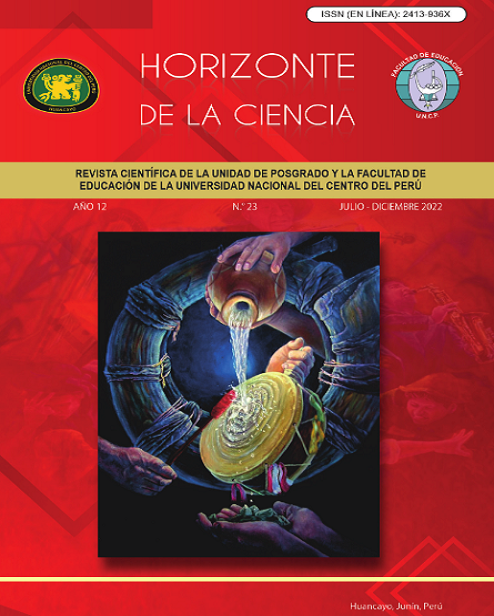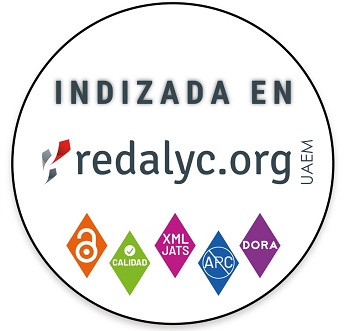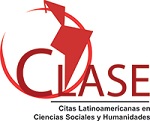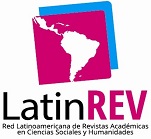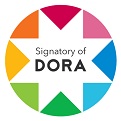Ensaios argumentativos para otimizar a avaliação das aprendizagens na pós-graduação
DOI:
https://doi.org/10.26490/uncp.horizonteciencia.2022.23.1474Palavras-chave:
ensaios acadêmicos, avaliação de competências, estudos de pós-graduação, bancos de dados, aprendizagem virtualResumo
A aprendizagem virtual se destaca como uma oportunidade para o desenvolvimento do aprender a aprender, devido à produção acelerada do conhecimento, ao desenvolvimento das tecnologias da informação e da comunicação, as mudanças na sociedade e na saúde, como o isolamento social pela pandemia mundial. Mas em nosso país não se utilizam ferramentas adequadas para a educação virtual, o que pôde ser ocasionado por uma lei universitária que obrigava a formação presencial, arrastando costumes e ferramentas para a formação de pós-graduação. O objetivo deste ensaio é justificar que a forma de avaliar e melhorar o aprendizado na pós-graduação é mediante a redação de um ensaio argumentativo, pois, dessa forma, o estudante, ademais de revisar suas habilidades de redação, expõe os argumentos que sustentam sua resposta num problema com uma série de informações conectadas e explicadas com referências obtidas de bases de dados acadêmicos de alto nível e o apoio de ferramentas informáticas.
Downloads
Referências
Azlan, C. A., Wong, J. H. D., Tan, L. K., A.D. Huri, M. S. N., Ung, N. M., Pallath, V., Tan, C. P. L., Yeong, C. H., & Ng, K. H. (2020). Teaching and learning of postgraduate medical physics using Internet-based e-learning during the COVID-19 pandemic – A case study from Malaysia. Physica Medica, 80, 10–16. https://doi.org/10.1016/j.ejmp.2020.10.002
Coates, H., & Mahat, M. (2014). Advancing student learning outcomes. In Higher Education Learning Outcomes Assessment: International perspectives.
Crook, C., & Nixon, E. (2021). How internet essay mill websites portray the student experience of higher education. Internet and Higher Education, 48(February 2020), 100775. https://doi.org/10.1016/j.iheduc.2020.100775
Dickinson, P., & Adams, J. (2017). Values in evaluation – The use of rubrics. Evaluation and Program Planning, 65, 113–116. https://doi.org/10.1016/j.evalprogplan.2017.07.005
Efthymiou, L., Epaminonda, E., & Ktoridou, D. (2021). Engineering to Management Transition. In Cases on Engineering Management Education in Practice (pp. 105–123). University of Nicosia. https://doi.org/10.4018/978-1-7998-4063-3.ch006
Elsevier. (2021). Mendeley. Simplify your workflow, accelerate your research. Elsevier. https://www.elsevier.com/solutions/mendeley
Fernando, W. (2018). Show me your true colours: Scaffolding formative academic literacy assessment through an online learning platform. Assessing Writing, 36, 63–76. https://doi.org/10.1016/j.asw.2018.03.005
Filho, A. H., do Prado, H. A., Ferneda, E., & Nau, J. (2018). An approach to evaluate adherence to the theme and the argumentative structure of essays. Procedia Computer Science, 126, 788–797. https://doi.org/10.1016/j.procs.2018.08.013
Foresman, G. A., Fosl, P. S., & Watson, J. C. (2017). The critical thinking toolkit. Wiley Blackwell.
Gray, J. S., Connolly, J. P., & Brown, M. A. (2019). Measuring intercultural knowledge and competence in college essays: Does a performance-based rubric have construct validity? Studies in Educational Evaluation, 62, 142–148. https://doi.org/10.1016/j.stueduc.2019.05.007
Ho, V., & Li, C. (2018). The use of metadiscourse and persuasion: An analysis of first year university students’ timed argumentative essays. Journal of English for Academic Purposes, 33, 53–68. https://doi.org/10.1016/j.jeap.2018.02.001
Hyland, K. (2005). Metadiscourse: Exploring Interaction in Writing. Continuum.
Kapasia, N., Paul, P., Roy, A., Saha, J., Zaveri, A., Mallick, R., Barman, B., Das, P., & Chouhan, P. (2020). Impact of lockdown on learning status of undergraduate and postgraduate students during COVID-19 pandemic in West Bengal, India. Children and Youth Services Review, 116, 105194. https://doi.org/10.1016/j.childyouth.2020.105194
Klimova, B. F. (2011). Making academic writing real with ICT. Procedia Computer Science, 3, 133–137. https://doi.org/10.1016/j.procs.2010.12.023
Kuzborska, I., & Soden, B. (2018). The construction of opposition relations in high-, middle-, and low-rated postgraduate ESL Chinese students’ essays. Journal of English for Academic Purposes, 34, 68–85. https://doi.org/10.1016/j.jeap.2018.03.013
Leyland, C. (2021). The interactional construction of the academic reader in writing tutorials for international students: An advice-giving resource. Linguistics and Education, 61, 100900. https://doi.org/10.1016/j.linged.2020.100900
McAvinia, C. (2016). Enter the VLE. In Online Learning and its Users (pp. 11–34). Elsevier. https://doi.org/10.1016/B978-0-08-100626-9.00001-0
Myskow, G., & Underwood, P. R. (2020). Applying concepts in international relations: The language of causal explanation in high- and low-graded concept-application essays. English for Specific Purposes, 60, 113–126. https://doi.org/10.1016/j.esp.2020.06.002
North, S. (2005). Different values, different skills? A comparison of essay writing by students from arts and science backgrounds. Studies in Higher Education, 30(5), 517–533. https://doi.org/10.1080/03075070500249153
Pelger, S., & Nilsson, P. (2016). Popular Science Writing to Support Students’ Learning of Science and Scientific Literacy. Research in Science Education, 46(3), 439–456. https://doi.org/10.1007/s11165-015-9465-y
Petchko, K. (2018). What Is Academic Writing? In How to Write About Economics and Public Policy (pp. 1–18). Elsevier. https://doi.org/10.1016/B978-0-12-813010-0.00001-6
Reinhold, I., Batstone, K., González, I. G., Troian, A., & Yu, R. (2017). Quality of academic writing for engineering students at lund university. Industrial Engineering and Management, 14(1), 15.
Rigby, D., Burton, M., Balcombe, K., Bateman, I., & Mulatu, A. (2015). Contract cheating & the market in essays. Journal of Economic Behavior & Organization, 111, 23–37. https://doi.org/10.1016/j.jebo.2014.12.019
Schei, E., Fuks, A., & Boudreau, J. D. (2019). Reflection in medical education: intellectual humility, discovery, and know-how. Medicine, Health Care and Philosophy, 22(2), 167–178. https://doi.org/10.1007/s11019-018-9878-2
Wingate, U. (2012). ‘Argument!’ helping students understand what essay writing is about. Journal of English for Academic Purposes, 11(2), 145–154. https://doi.org/10.1016/j.jeap.2011.11.001
Publicado
Edição
Seção
Licença

Este trabalho está licenciado sob uma licença Creative Commons Attribution-NonCommercial 4.0 International License.

